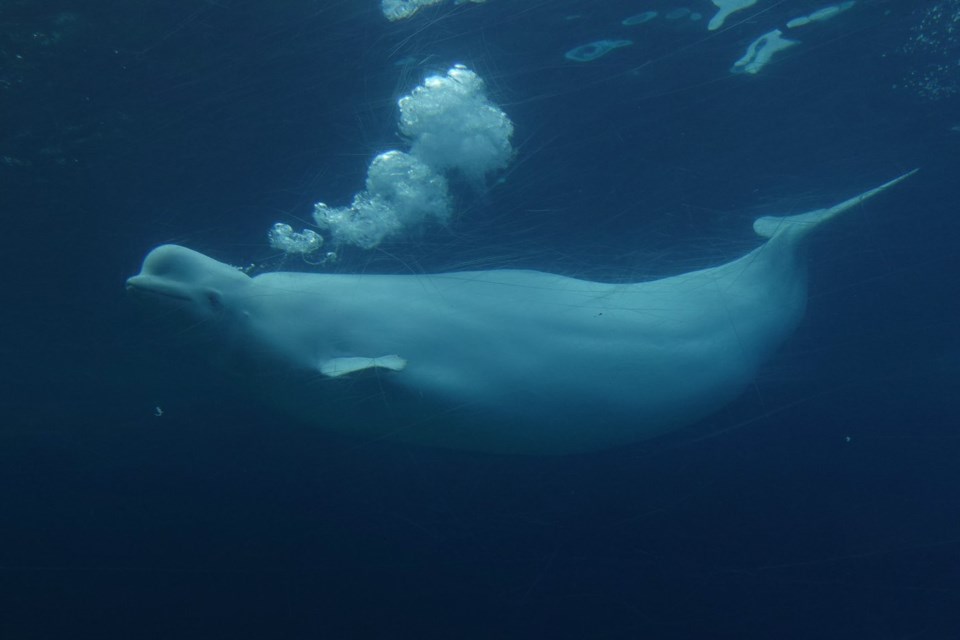Marineland is set to sever its sprawling property so it can take out mortgages in order to fund park operations and eventually move its animals, including more than two dozen beluga whales, the tourist attraction said at a public hearing Tuesday.
The City of Niagara Falls approved Marineland's application to divide the property following a committee of adjustment hearing.
Marineland has said it is transitioning to new ownership, but a lawyer for the park said it has not yet been sold and Marineland needs money.
In a planning justification brief filed with the city for the application, Marineland said that it has secured third-party financing that "requires the owner to remove the marine animals from the property expeditiously."
Financing is critical, said Tom Richardson, a lawyer who represents Marineland.
"It's important that this financing is put in place for a number of reasons: to maintain the property and the mammals," he said at the public meeting.
Eighteen belugas, one killer whale and one dolphin have died at Marineland since late 2019. Marineland euthanized a seven-year-old beluga earlier this month after a long battle with several different medical conditions, it said.
Marineland has long defended its treatment of animals and says the deaths are part of the natural cycle of life.
In the summer of 2023, a Canadian Press reporter and photographer visited Marineland. Staff said there were 37 belugas in the park at the time. Shortly after the visit, Marineland banned the reporter from its property.
The provincial government has now confirmed that six belugas have died since that visit, and 18 since late 2019. It is believed 31 belugas are still at Marineland, the last remaining captive whales in Canada.
The park has yet to be sold and the money Marineland raises through the financier will not go toward expanding the park or keeping the animals there forever, Richardson said.
"It's to address the elephant in the room, and that is the moving of the whales and other creatures," he said.
After the animals are removed, Marineland would merge the land parcels back together, Richardson said. The city implemented a condition that the park's newly created lots can be mortgaged, but cannot be sold off individually.
Neighbours who attended Tuesday's hearing said they were worried about the future of the park and its impact on their own properties. Richardson and the city assured them that because Marineland has its own special zoning to operate as a theme park, any changes would trigger a number of processes, including public consultations.
Richardson said nothing is in motion until Marineland gets financing to deal with its animals. Several animal rights organizations at the meeting offered to help relocate them.
The Whale Sanctuary Project, a proposed sea pen for formerly captive whales and dolphins in Nova Scotia's Port Hilford Bay, said it wants to host Marineland's belugas.
"The animals at Marineland have entertained and contributed to the economy of Canada for over 50 years, and we believe that it is a national priority for us to provide a safe and comfortable retirement for them in a natural setting," said Lori Marino, president of the sanctuary.
She said they are "poised" to begin construction on the sanctuary.
Marineland said in 2021 that the sanctuary would not be suitable for its whales due to pollution from old mines and tailing ponds in the area. The Whale Sanctuary Project has disputed those claims.
World Animal Protection would help with "an emergency solution" to move Marineland's whales to a sanctuary, said its campaign director Melissa Matlow.
Animal Justice pressed the city and Marineland for more details on where the animals would be moved.
"If they are severing the land to secure an operational loan for the purposes of moving these animals, then it is absolutely in the interests of the committee to better understand what that undertaking looks like," said Ben Delanghe, a lawyer with Animal Justice.
A U.S. biology professor cautioned the hearing about moving the belugas to an ocean sanctuary.
"While we all hope and imagine in our minds that bringing animals as close to the wild as they can be is perhaps the best thing for them, one of the things that we are finding is that animals that have lived in pools for a substantial amount of time do not acclimate as readily to the ocean as one would hope," said Jason Bruck, a professor with Stephen F. Austin State University and the president of the Marine Mammal Research Network.
He cited his own study looking at the health of two belugas that were moved to an ocean sanctuary in Iceland from a marine park in China.
Bruck said those belugas are stressed and have developed ulcers.
The city welcomed all comments, but said animal welfare concerns are outside the purview of the committee of adjustment.
Marineland only opened for two months rather than its usual five-month stretch last year. Tickets were heavily discounted as rides were off limits and many of the animals were off limits to the paying public.
The province's Animal Welfare Services has visited the park more than 200 times since launching an ongoing investigation in 2020.
It declared all marine mammals at the park in distress in 2021 due to poor water quality and ordered Marineland to fix the issue. Marineland briefly appealed that order before dropping the appeal.
Last November, the province's chief animal welfare inspector gave an interview about the probe for the first time.
Melanie Milczynski said the park had previously not met the standard of care for water quality, but the water was considered acceptable at the time of the interview after a significant investment by Marineland.
This report by The Canadian Press was first published Feb. 19, 2025.
Liam Casey, The Canadian Press

